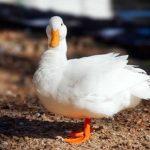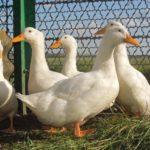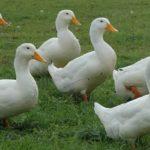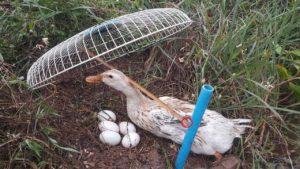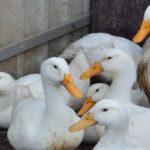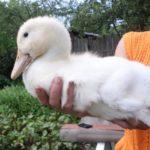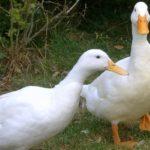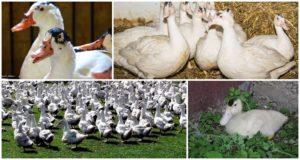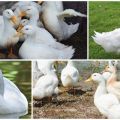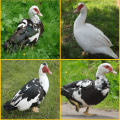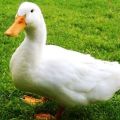Description and characteristics of ducks of the French breed CT5, rearing and care
Raising and breeding meat breeds of ducks is one of the lucrative branches of the poultry industry. Among the duck varieties, the French ducks, bred from the Peking and musk ducks, stand out. Consider their origin, description and characteristics, pros and cons, features of breeding, cultivation, how to make a diet, what diseases can be encountered and how to avoid them.
Origin
Peking duck cross ST5 (CT5) bred in France. This is a meat-based poultry, a hybrid used for industrial cultivation. Cross is obtained from 4 selected pure lines of Peking breed. The cross was improved after 2004, now the company supplies poultry to 4 continents. Ducks have typical broiler characteristics, they feed quickly, for which they are appreciated by poultry farmers. Simultaneously with the Peking cross, the company introduced hybrids of musk ducks - the ST6 C and ST6 LC crosses.
Appearance and characteristics of the breed
The French duck looks like a meat bird - with a strong constitution, massive, dense, with a lot of muscle mass, especially on the breast. Representatives of the cross grow rapidly, in 42 days of cultivation they reach a weight of 3.5 kg, while spending 1.88 feed per 1 kg of weight gain. units The plumage of ST5 is pure white, which allows you to receive income from the sale of a feather.
A heavy line of Peking ducks are raised as broilers, both in industrial factories and in households.
The description of the breed states that ducks can also be kept as good laying hens - in 1 season from each duck you can get, on average, 296 eggs, weighing 88 g each. If you get ducklings on your farm, then their survival rate is 96%.
Pros and cons of French ducks
Disadvantages of French ducks crosses: you cannot get ducklings at home from your ducks, as these are hybrids.
Requirements for maintenance and care
Despite the undemanding nature of French hybrids, you need to take a responsible attitude to the organization of their maintenance and care for them. Ducks raised for meat as broilers and as breeders should live in a spacious room. Each duck must have at least 0.5 sq. m. area.
If birds are forced to live in cramped conditions, they will not only fail to show their potential, but will also start to get sick.
A duckhouse for French ducks should be warm, light and dry. Dampness, stuffiness, cold or heat, drafts and air filled with ammonia are not allowed. The floor of the duck room must be covered with a layer of moisture-absorbing material - straw, peat, hay.You need to change it as soon as it gets dirty. Dirty litter is the cause of the spread of infections and digestive diseases, which leads to the death of birds.
House temperature and humidity range from 20 to 30 ˚С and 60-70%. Lighting in the summer is natural, in winter it is artificial, lasting 10-12 hours. If the daylight hours are shorter, the layers will run worse. We must not forget about the daily airing of the house. The fresh air that ducks breathe keeps them healthy.
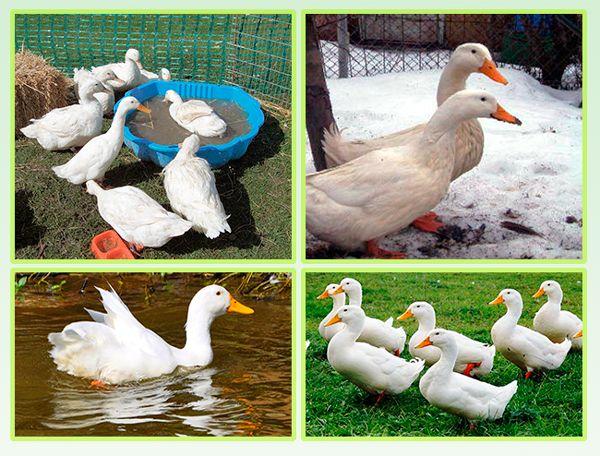
Like ducks of other breeds, ducks of French crosses need to be released for a walk - on a pond or on a walking yard. Its area should be such that for each sq. m. accounted for 1 bird. On the platform, you can put a container into which you can pour water for bathing. The ducks should spend at least 8 hours a day walking.
Diet
Like any breed or cross of meat and broiler direction, French Orvia ducks are distinguished by their accelerated metabolism. They eat a lot and often, absorb nutrients well from feed, converting them into muscle mass, that is, into meat. You can only achieve good results in feeding ducks if you approach this issue with full responsibility. You need to feed poultry, especially those fed for meat, at least 3 times a day, or even more often.
The diet consists of herbaceous and grain foods. Ducks eat soft food, better absorb nutrients from wet mash or crumbly cereals than from dry grains. They, unlike chickens, do not digest whole grains poorly, they need to be given a small section and preferably boiled. Add herbal chaff, grated vegetables and root crops to the mash or porridge, mix in chalk, salt, premixes.
French ducks love to swim and do not mind visiting the pond. If water is nearby, you can release birds into the pond. In their natural environment, they will find food, so they hardly have to feed.
Features of breeding and growing at home
You can get your French cross ducklings only if you buy a hatching egg and hatch the ducklings in an incubator. The second option is to purchase young animals from breeding farms. Ducks are hybrid, so they cannot be bred as thoroughbred, getting generations of birds at home. With each new generation, hybrid qualities will disappear.
The incubation of French ducks eggs is the same as for other breeds. Further care for the chicks consists of placing them in a brooder and feeding them until they are one month old. If the ducklings are under the duck, then it must be transplanted with the offspring separately for the same time.
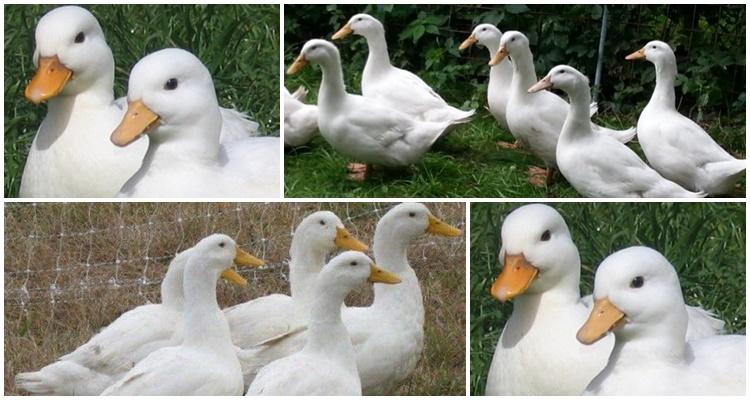
Ducks of French selection are fed for 1.5 months. By this age, as the manufacturers promise, they will weigh up to 3 kg. Then the growth rate will decrease, but the appetite will increase. The ducks will eat more, but the gain will slow down. Therefore, only those birds that will lay eggs can be left for further maintenance.
Diseases and prevention from them
Subject to the conditions of hygiene, proper feeding, hybrids rarely get sick. They are characterized by health, endurance, activity. But if you neglect the conditions of detention, keep the bird in the mud, do not walk it, feed it badly or improperly, diseases will not slow down. Ducks of French crosses suffer from infectious diseases and pathologies of the digestive system, metabolic diseases. This leads to a deterioration in the performance of livestock, a slowdown in weight gain and mortality of poultry.
Prevention of infections and digestive diseases: regular house cleaning, timely feeding, water changes, daily walks. As well as disinfection of premises and equipment.
French ducks - new hybrids of Peking ducks and musk ducks - are bred for industrial use. But they can be kept in the household as well. The technology of keeping and feeding, care and breeding is standard, so the poultry farmer should not have any difficulties. You can breed ducks for yourself or organize a small duck farm, crosses are suitable for organizing breeding for meat and making a profit.
